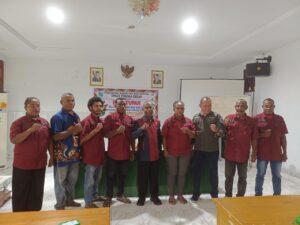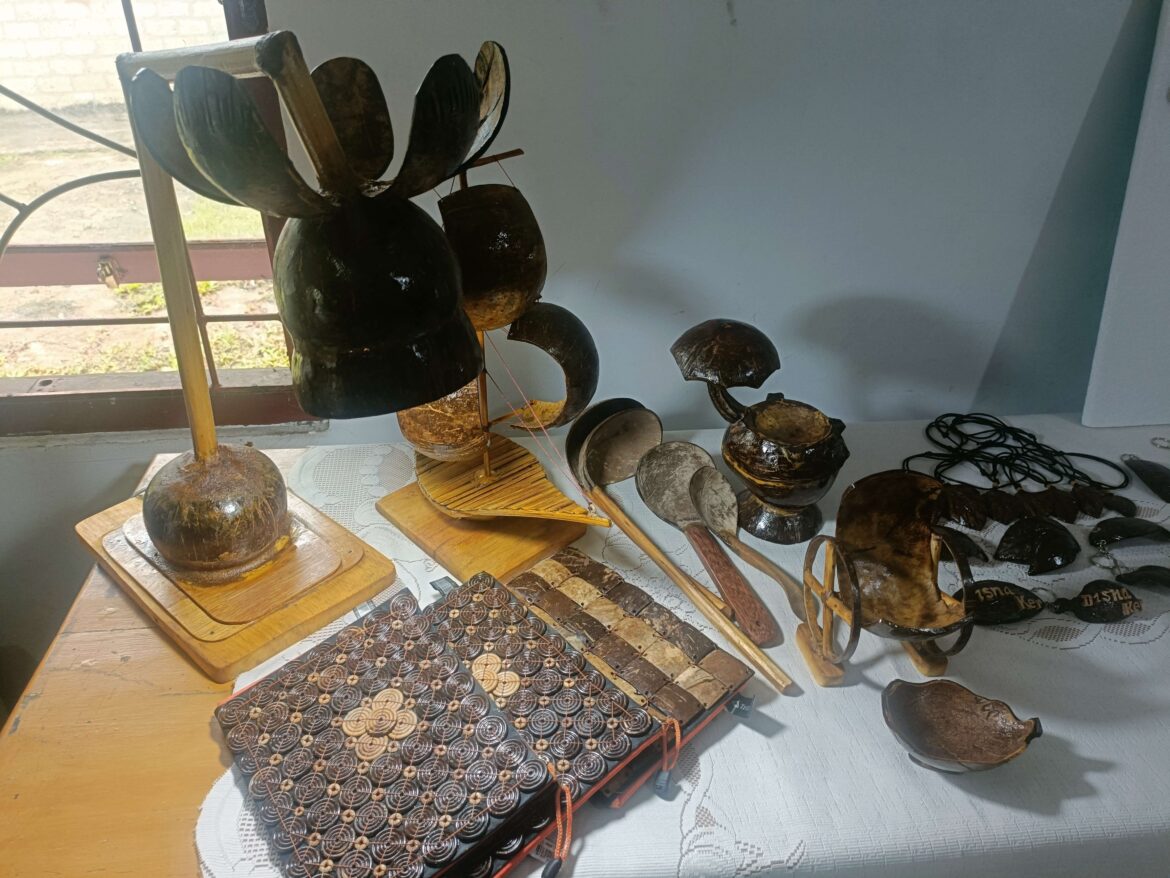In the quiet coastal regency of Biak Numfor, Papua Barat, a small but meaningful movement is taking shape—one that blends tradition, creativity, and government policy into a single, hopeful narrative. The regional government has distributed special autonomy (Otsus) assistance in the form of souvenir-making equipment to groups of Indigenous Papuans. Supported by vocational training, this initiative seeks to transform local potential into sustainable employment, turning coconut shells and wood into handcrafted souvenirs with cultural and commercial value.
This program is more than an economic intervention; it represents the evolving spirit of Otsus Papua, which aims to empower Indigenous Papuans (OAP) through education, entrepreneurship, and local resource development. It is a story about how policy can meet creativity—and how the government’s commitment to inclusion is beginning to shape real livelihoods across eastern Indonesia.
Transforming Coconut Shells into Livelihoods
The Biak Numfor Manpower Department recently completed a nine-day training program for 26 Indigenous Papuans to master the art of souvenir-making from coconut shells. The training ran from October 23 to November 1, 2025, and focused on crafting decorative and functional items that reflect Biak’s rich maritime and cultural identity.
Coconut shells, often discarded as agricultural waste, were reimagined as raw material for creativity. From carved ornaments and keychains to bowls and lamps, participants learned how to turn a local, abundant resource into income-generating products. According to Acting Regional Secretary Semuel Rumaikeuw, the goal is to help Indigenous residents convert natural wealth into opportunity.
“The coconut shell potential in our villages is very abundant,” Rumaikeuw said at the closing ceremony. “We want the people of Biak, especially Indigenous Papuans, to innovate and use these resources to improve their family income.”
This approach highlights a key principle of Indonesia’s Special Autonomy framework: empowering local communities to manage their resources independently and develop small-scale industries that can thrive within their cultural context.

From Training to Tools: Turning Knowledge into Practice
While training is essential, the Biak Numfor government understood that skills must be matched with the right tools. Soon after completing the workshop, the regency government distributed Otsus-funded production equipment to three groups of Indigenous Papuan entrepreneurs. Each group received a set of machines and tools for souvenir production, including grinders, polishing tools, drills, and wood-cutting devices—allowing them to immediately apply their newly acquired skills.
Head of the Biak Numfor Manpower Office, Djoni Domeng, explained that the assistance was designed as a direct bridge from training to practice.
“Each work equipment package contains seven machines to support souvenir production,” Domeng said. “This Otsus assistance is a real effort to ensure that Indigenous Papuans can start working productively and independently after training.”
The local government’s emphasis on follow-through—training, equipment, and monitoring—illustrates a practical implementation of Otsus funds that strengthens small enterprises, fosters self-reliance, and encourages entrepreneurship at the village level.
Voices from the Ground: Hope and Determination
For many of the beneficiaries, the program represents not just economic support but validation of their capacity as local entrepreneurs.
Linda Rumere, one of the participants from Bindusi Village in East Biak, said the experience has opened her eyes to new possibilities.
“I learned how to process coconut shells into souvenir products,” she said. “This training is very useful because it can help increase my family’s income.”
Another recipient, Fery Manggombo, echoed her optimism after receiving equipment support.
“We are very grateful for this Otsu’s assistance,” he said. “The machines will help us increase production and reach more customers.”
Their voices reveal the broader emotional dimension of Papua’s development: empowerment is not only about tools and training but also about restoring confidence and providing Indigenous Papuans with a sense of ownership in their economic future.
Local Creativity and National Policy in Harmony
The souvenir-making initiative in Biak Numfor is part of a wider national effort to enhance economic inclusion under Otsus Papua. Rather than relying solely on large-scale infrastructure or subsidies, the government has increasingly emphasized micro-entrepreneurship, vocational training, and community-driven innovation.
This aligns with the Indonesian government’s long-term vision for Papua—to ensure that economic equality grows alongside political stability and cultural preservation. By enabling Indigenous Papuans to become producers rather than dependents, Otsus programs foster dignity and self-determination.
The Otsus Law, first enacted in 2001 and renewed in 2021, was designed to give Papua greater fiscal and administrative flexibility. The Biak souvenir program is a small but powerful example of that framework in action: regional authorities deciding locally how to use special autonomy funds to meet real community needs.
Such initiatives also help bridge cultural heritage and modern enterprise. Souvenir products rooted in traditional design can attract both domestic and international markets, particularly as tourism in Papua begins to recover post-pandemic. By strengthening creative industries, Papua not only preserves its artistic identity but also positions itself as a competitive region in Indonesia’s broader creative economy landscape.
Challenges and the Road Ahead
Despite its promise, sustaining programs like this in remote regions presents several challenges. Equipment maintenance, consistent raw material supply, and access to larger markets are key factors determining long-term success.
Officials have urged participants to maintain the machines carefully and continue honing their skills. Without follow-up mentoring and market access, small artisans could struggle to expand beyond local markets. However, the Biak government has pledged to provide ongoing supervision and connect trained groups with potential buyers, tourism offices, and cooperatives.
To sustain momentum, local authorities are considering integrating souvenir artisans into regional MSME (micro, small, and medium enterprise) programs. This would allow them to participate in trade fairs, access credit, and benefit from digital marketing support.
This integration could make the Biak initiative a model that other regions in Papua Barat and Papua Pegunungan can follow, ensuring that Otsus funds lead to lasting and expandable economic change.
Creating Inclusive Growth through Local Industry
The Biak Numfor program is not an isolated case—it forms part of Indonesia’s broader effort to make special autonomy a vehicle for inclusive development. By focusing on local industries that use renewable resources and cultural motifs, the government promotes an economic model that is environmentally friendly, socially inclusive, and culturally relevant.
More importantly, it demonstrates how Indigenous Papuans can be active participants in national development. Rather than being considered passive recipients of aid, they are recognized as skilled artisans, business owners, and creative entrepreneurs capable of contributing to Papua’s and Indonesia’s future.
The emphasis on skills and equipment also reflects a shift in policy thinking—from short-term welfare to productive empowerment. It acknowledges that the sustainability of Otsus depends not only on fiscal transfers but also on whether those funds translate into real skills, jobs, and confidence among Papua’s Indigenous population.
Conclusion
The souvenir-making initiative in Biak Numfor captures a crucial moment in Papua’s development journey. It is a story about how the Special Autonomy framework, when implemented effectively, can connect national policy with local action and cultural identity.
From the carving of coconut shells to the humming of new machines, the program’s impact is tangible: families are earning, artisans are creating, and communities are regaining pride in their craftsmanship. What began as a small training project has become a model of how autonomy, culture, and enterprise can intersect to build a stronger, more inclusive Papua.
As Indonesia continues to refine and expand Otsus, initiatives like this remind us that true development begins with people—empowered, skilled, and inspired to shape their future.
“Use the skills and competencies you’ve gained,” said Acting Secretary Rumaikeuw at the closing ceremony. “Start creating and innovating. Because when Indigenous Papuans rise through creativity, Papua rises with them.”


